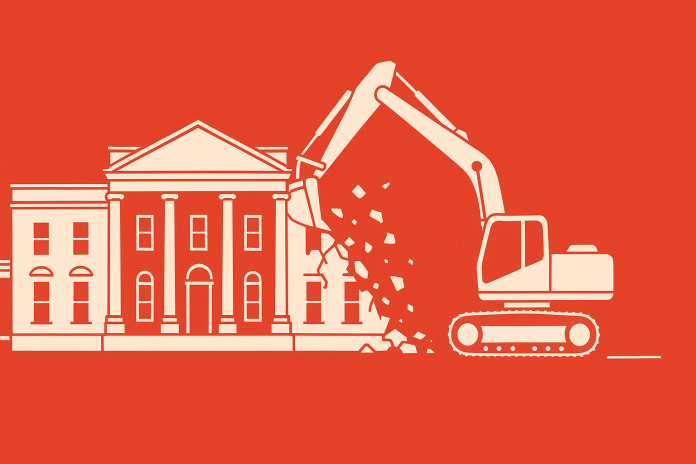WASHINGTON, D.C. — The United States is twenty-four days into one of the longest government shutdowns in modern history, but power in Washington has never looked more concentrated — or more detached from the people it claims to serve.
With Congress paralyzed, the military under new communication gag orders, and the East Wing of the White House now reduced to rubble, critics are warning that the American government is entering an era defined not by transparency or accountability, but by control.
A Government Shuttered — and Shutting Out the Public
On paper, the shutdown is about money. In practice, it’s about something larger: who gets heard when the government goes silent. While millions of Americans brace for the expiration of SNAP benefits and federal aid programs on November 1, top officials continue to operate unchecked. Congressional committees have been frozen for nearly a month. Hearings are suspended. Oversight is impossible.
And in that vacuum, decisions are being made — monumental ones.
The demolition of the White House East Wing began with almost no public notice and minimal press access, despite the site’s deep symbolic roots. For more than a century, the East Wing has housed the First Lady’s offices and hosted events tied to women’s political and civic leadership — a living emblem of American progress.
Now, it’s gone. Flattened in the middle of a government shutdown, with no independent oversight and no public contract disclosures. Federal officials have restricted photography from nearby Treasury grounds, citing “security concerns.” The administration insists the demolition clears space for “renovations and expansion,” including a new ceremonial complex. But for many, the secrecy surrounding the project represents a deeper kind of destruction: of trust, and of access to the people’s house itself.
The Pentagon Goes Quiet
At the same time, Defense Secretary Pete Hegseth has issued a sweeping new directive barring nearly all Pentagon personnel — including service chiefs and combatant commanders — from speaking directly to Congress without prior approval. The rule consolidates communication under the Office of Legislative Affairs, effectively routing every exchange through a political filter.
The Pentagon calls it “a pragmatic review.” Insiders call it something else: a silencing mechanism. Several defense officials told CNN the order has already slowed or stopped congressional inquiries, preventing lawmakers from obtaining unfiltered assessments of national security decisions.
This isn’t a bureaucratic technicality — it’s the erosion of one of America’s oldest safeguards: civilian oversight of the military. When the generals are told who they can speak to and what they can say, the military ceases to be accountable to the people’s representatives.
The President, the Payout, and the People Left Behind
Even as the shutdown grinds on and millions face the loss of food and housing assistance, President Donald Trump is reportedly pressing his own Justice Department to pay him $230 million as a “settlement” for investigations he faced during prior administrations.
The proposed payout — first reported by The New York Times and confirmed by multiple outlets — would be approved by officials who either worked for or defended Trump in the past. Legal experts have called the arrangement “unprecedented,” noting that it would amount to the sitting president negotiating financial compensation from his own subordinates.
In remarks from the Oval Office, Trump brushed off concerns, saying: “I’m the one that makes the decision, right? It’s interesting — you have to decide how much you’re paying yourself in damages.”
That sentiment, perhaps unintentionally, captures the new political order in miniature: a system where those in power pay themselves while the public waits in line.
A Republic Reversed
In a functioning democracy, government power is limited by law, balanced by oversight, and responsive to citizens. In 2025, each of those principles is being tested.
The military cannot speak freely to Congress. The press cannot see what is being built — or destroyed — at the White House. The Justice Department is negotiating settlements with the man who controls it. And a shutdown, now nearing record length, ensures that no one outside the executive branch can meaningfully intervene.
“This isn’t governance,” said one senior congressional aide, who spoke on condition of anonymity. “It’s consolidation. The public sees chaos, but what’s really happening is control — piece by piece.”
For many, the East Wing’s demolition has become a metaphor for something larger: the tearing down of the democratic architecture that once defined the nation. A wing built for the public and associated with the advancement of women was erased from the landscape, just as public access and civil rights protections are being quietly scaled back elsewhere.
Anti-American, or Post-American?
The question, once rhetorical, now lands differently: is this still the same America?
To call it an “anti-American state” may sound like political hyperbole. But for those watching power concentrate in the shadows of shutdown, secrecy, and self-enrichment, the term feels less like accusation and more like observation.
The nation that once exported democracy is now struggling to preserve its own. Its people face hunger, silence, and spectacle — a government at war with itself, a White House that razes its own symbols, a Pentagon that cannot speak, and a president who wants to be paid.
The founders warned that republics do not collapse all at once; they corrode slowly, choice by choice, law by law. Twenty-four days into paralysis, with accountability suspended and oversight dismantled, the corrosion is no longer hypothetical.
The question is no longer whether America is at risk of becoming an anti-American state — but whether it already has.




